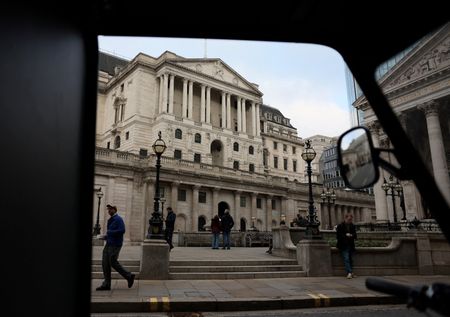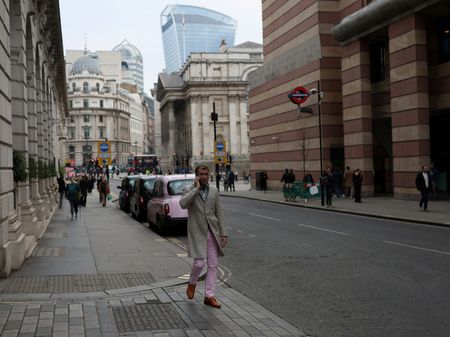By Suban Abdulla
LONDON (Reuters) -Investors added to bets on the Bank of England cutting interest rates and short-term government bond yields hit a three-month low as global markets braced for a hit to economic growth caused by U.S. President Donald Trump’s plans for import tariffs.
Interest rate futures pointed to about 81 basis points of reductions to the BoE’s Bank Rate by December this year, compared with 75 bps on Friday which represented a full pricing of three quarter-point rate cuts.
The chance of a quarter-point rate cut on Thursday, after this week’s BoE Monetary Policy Committee meeting, was seen as a 94% probability, also up from Friday.
Hetal Mehta, head of economic research at wealth management firm St. James’s Place, said Trump’s announcement of tariffs on goods from Canada, Mexico and China could add to concerns among some MPC members about the risk of an economic slowdown.
“Any further weakness in the euro area economy will likely spillover to the UK,” Mehta said. “For some MPC members, the case for a pre-emptive cut may be enhanced.”
Yields on short-term British government bonds hit their lowest since just before finance minister Rachel Reeves’ budget announcement on Oct. 30 which included extra borrowing and tax increases for businesses that have weighed on corporate hiring.
Two-year gilt yields fell to 4.113%, the lowest since Oct. 25 and down about 8 basis points on the day while 10-year yields touched their lowest since Dec. 16 at 4.448%.
Yields reversed some of their losses after Trump paused the introduction of import tariffs on goods from Mexico for a month.
Despite the jump in UK bond prices from their mid-January low, when they were hit hard by a global government debt selloff ahead of Trump’s inauguration, Peder Beck-Friis, an economist at asset manager PIMCO, said gilts remained attractive.
“While inflation will likely rise in the coming quarters, the main driver — the national insurance hike — is a one-time tax shock that central banks typically look through,” he said, referring to Reeves’ decision to raise social security contributions for employers.
“If wage growth falls and the labour market weakens, we expect the Monetary Policy Committee (MPC) to look through any short-term price pressures and instead focus on the medium-term outlook,” Beck-Friis said.
(Writing Suban Abdulla; editing by William Schomberg)










